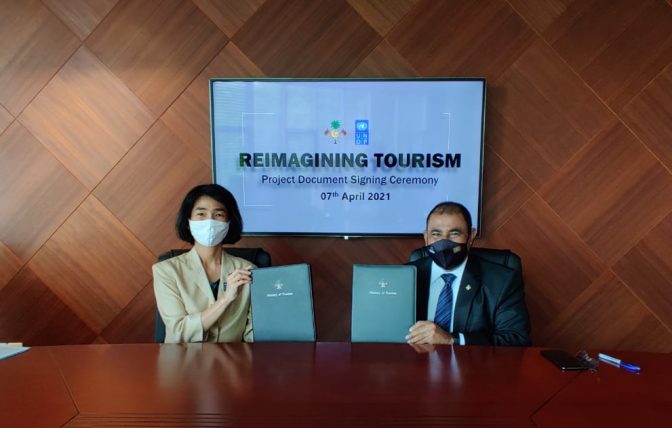

The Ministry of Tourism and United Nations Development Programme (UNDP) in the Maldives today signed the “GoM-UNDP Reimagining Tourism” project which aims to transform tourism in the Maldives with a focus on diversification of tourism, and enhanced community engagement under this project. Tourism is to be diversified through community-led conservation and utilization of natural ecosystems and cultural heritage as a novel tourism product. This is envisioned to facilitate a bigger role for local councils in tourism planning and enable the establishment of formal linkages of the tourism sector with traditional knowledge and livelihoods, creating avenues for greater participation of women and youth.
Speaking at the signing ceremony of the project, Minister of Tourism Dr. Abdulla Mausoom emphasized on the meaningful inclusion of women and youth towards sustainable development of tourism. The Minister further highlighted the role of local councils in local tourism planning and development, and the need to incorporate tourism in the land use plans. “Through this project, our belief is that local councils can fully utilize the authority assigned to them by the Decentralization Act,” Minister Mausoom said.
The project will support:
– Sustainable local island tourism development planning, through training of local stakeholders on sustainable tourism;
– Creation of sustainability thresholds for tourism development for local islands, and the creation of a decentralized local tourism audit mechanism, incorporating sustainability indicators;
– Marketing of local tourism opportunities, capitalizing on island-specific brand narratives built on unique natural cultural and historical assets of islands; and
– Reskilling of young people and women for greater participation in the tourism value chain.
The successful implementation of the project will demonstrate sustainable models for enhancing the dividend to nature and local communities from tourism, that could potentially be grown across the country.
In her speech, UNDP Resident Representative Akiko Fujii congratulated the Ministry of Tourism for their efforts in managing the COVID-19 impacts on the industry, and the resolve in building resilience of the tourism sector. “The reliance of the economy of the Maldives on tourism, is seen in the numbers. With over 26.3% direct contribution, and 70% indirect contribution to the GDP, it is no surprise that the impact of the COVID-19 pandemic has been felt across multiple sectors along with the tourism sector. The Rapid livelihood Assessment conducted by the Government and UNDP revealed that the ripple effect of these consequences had impacted construction, transport, wholesale and retail businesses. These further stresses the need for resilience building of the tourism industry,” Akiko said.
Akiko Fujii spoke about the need to think of a different future for tourism for countries such as the Maldives, belonging to the Small Island Developing States (SIDs) ecosystem. “The experience of the Maldives with this project, the successes, failures (if any), challenges and lessons learnt will be of much value to other SIDs who also find themselves grappling with challenges similar to the Maldives. I am happy to note that the project contributes to achieving the 2030 Sustainable Development Agenda.”
The ‘Re-imagining Tourism’ project is a joint initiative between the Government and UNDP Maldives to explore, develop and test pathways for making tourism in the country more inclusive, resilient and sustainable. In March, UNDP Maldives together with the Ministry of Tourism launched the virtual inception workshop of the project, bringing together over 50 stakeholders in the tourism and development ecosystem, both within the country as well as globally.
The ‘Re-imagining Tourism’ project will be implemented with a focus on local tourism segment in Laamu Atoll, over a period of 18 months. The project is funded through UNDP Core Funds under its Rapid Financing Facility and is a part of the global UNDP’s raised commitment to supporting SIDS countries’ COVID-19 sustainable recovery.